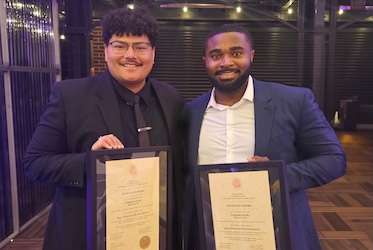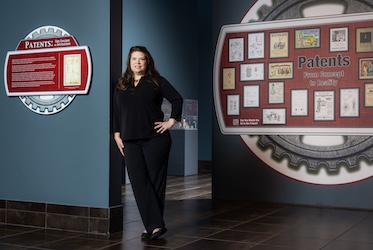
Alumnus Seeks to Inspire Next Generation of Architects Through Technology
KENNESAW, Ga. | Aug 31, 2020

Seven years after earning his architecture degree, alumnus Patrick Chopson said he is prepared to help the next generation of Kennesaw State University architecture students thrive in the world of data-driven design.
Recently, Chopson and his company, cove.tool, partnered with Kennesaw State’s College of Architecture and Construction Management to provide its software and expertise as part of a new studio course on precast concrete.
“One of the things that has been important to us is making sure the next generation of designers know how to use data-driven workflows as an integral part of what they do on a daily basis,” he said. “Contributing our software to this effort will allow them affect climate change with the tools to reduce carbon emissions and design better buildings.”
While studying architecture at the University, Chopson said he became acutely aware of climate change and the role that architecture could play in helping to reduce emissions. Currently, residential and commercial buildings account for nearly 40 percent of carbon dioxide emissions, according to Architecture 2030, but he said placing an emphasis on energy modeling while designing a building can help reduce emissions by 40 to 60 percent.

After studying high performance building at the Georgia Institute of Technology, Chopson quickly learned that many professionals did not have the tools to run the necessary energy calculations on their own. In 2017, he launched cove.tool with business partner Sandeep Ahuja, a platform which allows architects to run building performance models automatically while also reducing construction costs. Backed by venture capital, the company has since grown to 14 employees and is used in over 22 different countries around the world.
“I view the software as an extension of the design principles I learned at the former Southern Polytechnic State University” Chopson said. “A lot of that centers around combining architecture and technology together, and seeking innovative ways to approach complex challenges.”
Chopson credits Ed Akins, interim chair of the Department of Architecture, and Liz Martin-Malikian, thesis coordinator and associate professor of architecture, as being major influences on his studies and eventual career. It was through Akins that he was connected to his first professional job out of college, and Martin-Malikian was instrumental in fostering his outside-the-box approach to architecture. His undergraduate thesis, which centered around a Mars colony, continues to captivate successive cohorts of architecture students, many of whom attempt their own version of this interesting design problem.
While still a student, he recalls speaking to retired dean Rich Cole about the prospects of becoming a professor himself, at first balking at the suggestion that he could make an impact in the classroom. However, after spending time in industry, Chopson has since gone on to teach a studio course on sustainable design and architecture theory at KSU and design communication. Seeing the next crop of architects flourish, just as he did as a student, is part of the reward, he added.
“When you teach, I think you learn something about yourself,” he said. “The students also bring forward great ideas, and it’s rewarding to help curate those ideas and celebrate their growth.”
– Travis Highfield
Photos submitted
Related Stories

Kennesaw State architecture, engineering students reimagine Asheville's devastated River Arts District

Kennesaw State architecture students win silver in International Design Awards for reimagining of Marietta Square

Kennesaw State student receives award from National Association of Home Builders

Master's degree led Kennesaw State alumna to career as museum collection manager
A leader in innovative teaching and learning, Kennesaw State University offers undergraduate, graduate, and doctoral degrees to its more than 47,000 students. Kennesaw State is a member of the University System of Georgia with 11 academic colleges. The university’s vibrant campus culture, diverse population, strong global ties, and entrepreneurial spirit draw students from throughout the country and the world. Kennesaw State is a Carnegie-designated doctoral research institution (R2), placing it among an elite group of only 8 percent of U.S. colleges and universities with an R1 or R2 status. For more information, visit kennesaw.edu.















